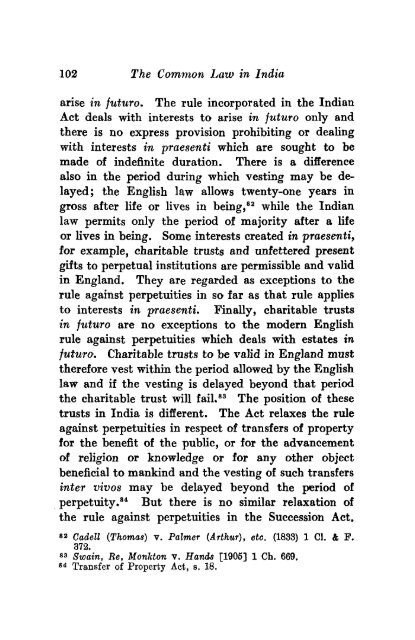The Common Law in India - College of Social Sciences and ...
The Common Law in India - College of Social Sciences and ...
The Common Law in India - College of Social Sciences and ...
- No tags were found...
You also want an ePaper? Increase the reach of your titles
YUMPU automatically turns print PDFs into web optimized ePapers that Google loves.
102 <strong>The</strong> <strong>Common</strong> <strong>Law</strong> <strong>in</strong> <strong>India</strong>arise <strong>in</strong> futuro. <strong>The</strong> rule <strong>in</strong>corporated <strong>in</strong> the <strong>India</strong>nAct deals with <strong>in</strong>terests to arise <strong>in</strong> futuro only <strong>and</strong>there is no express provision prohibit<strong>in</strong>g or deal<strong>in</strong>gwith <strong>in</strong>terests <strong>in</strong> praesenti which are sought to bemade <strong>of</strong> <strong>in</strong>def<strong>in</strong>ite duration. <strong>The</strong>re is a differencealso <strong>in</strong> the period dur<strong>in</strong>g which vest<strong>in</strong>g may be delayed;the English law allows twenty-one years <strong>in</strong>gross after life or lives <strong>in</strong> be<strong>in</strong>g, 82 while the <strong>India</strong>nlaw permits only the period <strong>of</strong> majority after a lifeor lives <strong>in</strong> be<strong>in</strong>g. Some <strong>in</strong>terests created <strong>in</strong> praesenti,for example, charitable trusts <strong>and</strong> unfettered presentgifts to perpetual <strong>in</strong>stitutions are permissible <strong>and</strong> valid<strong>in</strong> Engl<strong>and</strong>. <strong>The</strong>y are regarded as exceptions to therule aga<strong>in</strong>st perpetuities <strong>in</strong> so far as that rule appliesto <strong>in</strong>terests <strong>in</strong> praesenti. F<strong>in</strong>ally, charitable trusts<strong>in</strong> futuro are no exceptions to the modern Englishrule aga<strong>in</strong>st perpetuities which deals with estates <strong>in</strong>futuro. Charitable trusts to be valid <strong>in</strong> Engl<strong>and</strong> musttherefore vest with<strong>in</strong> the period allowed by the Englishlaw <strong>and</strong> if the vest<strong>in</strong>g is delayed beyond that periodthe charitable trust will fail. 83 <strong>The</strong> position <strong>of</strong> thesetrusts <strong>in</strong> <strong>India</strong> is different. <strong>The</strong> Act relaxes the ruleaga<strong>in</strong>st perpetuities <strong>in</strong> respect <strong>of</strong> transfers <strong>of</strong> propertyfor the benefit <strong>of</strong> the public, or for the advancement<strong>of</strong> religion or knowledge or for any other objectbeneficial to mank<strong>in</strong>d <strong>and</strong> the vest<strong>in</strong>g <strong>of</strong> such transfers<strong>in</strong>ter vivos may be delayed beyond the period <strong>of</strong>perpetuity. 84 But there is no similar relaxation <strong>of</strong>the rule aga<strong>in</strong>st perpetuities <strong>in</strong> the Succession Act.82 Cadell (Thomas) v. Palmer (Arthur), etc. (1833) 1 Cl. & P.372.83 Swa<strong>in</strong>, Re, Monkton v. H<strong>and</strong>s [1905] 1 Ch. 669.« 4 Transfer <strong>of</strong> Property Act, s. 18.
















